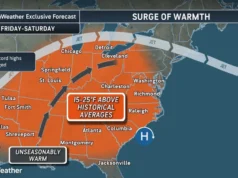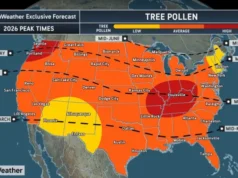
By Mike Schuler
The National Hurricane Center (NHC) achieved unprecedented accuracy in hurricane track forecasting during the 2024 Atlantic hurricane season, according to a preliminary forecast verification review by the National Weather Service.
The 2024 season set new records across all forecast intervals while facing unique challenges in intensity prediction.
The 2024 Atlantic season proved exceptionally active, surpassing normal levels across key metrics including the total number of tropical storms, hurricanes, and major hurricanes. The NHC issued 347 forecasts, exceeding the 1990-2023 average of 325, with particularly intense activity observed in the western Atlantic basin.
“NHC’s 2024 forecast track performance was its best in history,” report authors John Cangialosi and Jon Martinez noted, highlighting record-breaking accuracy at all forecast intervals from 12 to 120 hours.
However, intensity forecasting presented significant challenges, with 34 Rapid Intensification (RI) events recorded – nearly double the previous decade’s average. These events, defined as wind speed increases of at least 35 mph within 24 hours, continue to pose one of the most substantial challenges in hurricane forecasting.
Despite these challenges, the NHC achieved notable progress in predicting significant strengthening events, with superior detection probability and accuracy compared to real-time model guidance for storms that strengthened by 30 mph over 24 hours.
A significant milestone was reached when the NHC made its first-ever forecast of a pre-tropical cyclone system (pre-Helene) to achieve major hurricane status within 72 hours, reaching winds of 115 mph.
“Advances and increased trust in NWS regional hurricane models have aided in increased forecaster confidence to make these types of aggressive intensity predictions,” the report states.
However, these achievements come amid concerning staffing reductions initiated by the Trump Administration at the federal National Oceanic and Atmospheric Administration (NOAA), which includes the National Weather Service. The recent termination of hundreds of NOAA employees are raising significant concerns about the organization’s future capacity to maintain its current level of forecast accuracy.
The American Meteorological Society has warned that these cuts could severely impact the nation’s ability to respond to hazardous weather events. According to the AMS, weather and climate information contributes over $100 billion annually to the U.S. economy—approximately ten times what U.S. taxpayers invest in federal weather-related science and services.
The complete verification report, expected this spring, will provide comprehensive analysis of tropical cyclone forecast accuracy, genesis predictions, and forecasts for systems affecting U.S. coastal regions.
Disclaimer
Artificial Intelligence Disclosure & Legal Disclaimer
AI Content Policy.
To provide our readers with timely and comprehensive coverage, South Florida Reporter uses artificial intelligence (AI) to assist in producing certain articles and visual content.
Articles: AI may be used to assist in research, structural drafting, or data analysis. All AI-assisted text is reviewed and edited by our team to ensure accuracy and adherence to our editorial standards.
Images: Any imagery generated or significantly altered by AI is clearly marked with a disclaimer or watermark to distinguish it from traditional photography or editorial illustrations.
General Disclaimer
The information contained in South Florida Reporter is for general information purposes only.
South Florida Reporter assumes no responsibility for errors or omissions in the contents of the Service. In no event shall South Florida Reporter be liable for any special, direct, indirect, consequential, or incidental damages or any damages whatsoever, whether in an action of contract, negligence or other tort, arising out of or in connection with the use of the Service or the contents of the Service.
The Company reserves the right to make additions, deletions, or modifications to the contents of the Service at any time without prior notice. The Company does not warrant that the Service is free of viruses or other harmful components.












